Specialized Mental Health Care for the Elderly
Elderly Mental Health Care You Can Trust
At Mind Body Optimization (MBO), we believe that if you nurture the mind, and the body follows. With us, you’re stepping into a lifestyle where every aspect is designed with your unique needs in mind.
While aging is a privilege, it can also present unique challenges to mental well-being. That’s where MBO steps in, providing customized strategies and support designed for seasoned minds.
We aim to empower our clients, offering them the tools and support needed to navigate life’s transitions with grace and resilience. We strive to instill hope, ensuring that the golden years are lived with dignity and fulfillment.

Understanding Mental Health Challenges in the Elderly
As we age, our mental health needs change and evolve. Some of the most common challenges faced by older adults include:
Depression and Loneliness
Depression goes beyond temporary feelings of sadness. It’s a medical condition that can profoundly affect a person’s mood, energy, and ability to enjoy life. In the elderly, it may not always manifest as sadness but often appears as a loss of interest, energy, or motivation.1
Loneliness, on the other hand, stems from feeling disconnected or isolated from others. These feelings can lead to a decline in mental and physical health.
Cognitive Decline and Dementia
Grief and Loss
Grief and loss are common in older people as they face the deaths of peers, partners, and sometimes children. This loss can lead to profound sadness and a sense of emptiness. Grieving is a natural process, but it can become a concern if it leads to long-term depression or anxiety.
The Impact of Societal Factors on Elderly Mental Well-being
Evidence-Based Approaches to Elderly Mental Health Care
Psychotherapy for the Elderly
Psychotherapy is a cornerstone of effective elderly mental health care. It provides a safe, confidential environment. Here, clients can delve into their feelings, thoughts, and behaviors without judgment.
Our therapists are more than professionals; they are compassionate guides. They bring a deep understanding of the unique challenges faced by the elderly.
Cognitive-Behavioral Therapy (CBT)
- Coping with loss
- Managing chronic pain
- Overcoming feelings of isolation
Support Groups
Medication-Based Interventions
Holistic and Person-Centered Approaches
Mind-Body Practices for Stress Reduction
Stress can take a toll on both mind and body. At MBO, we use mind-body practices aimed at reducing stress. Techniques such as meditation and yoga are central to our approach. These practices have been shown to reduce the symptoms of anxiety and depression and promote well-being.
Mindfulness is the art of being fully present and engaged in the moment, aware of your thoughts and feelings without distraction or judgment. We encourage the integration of mindfulness into daily life.
Simple acts like mindful walking, where one pays attention to each step, or mindful eating, savoring each bite, can transform routine activities into moments of mindfulness. These practices help cultivate a sense of peace and focus, enhancing mental clarity and emotional balance.
Creative Therapies
Creative activities can be a crucial part of elderly mental health care plans. Whether it’s painting, playing an instrument, or singing, these activities bring happiness and relaxation. They can also help improve memory and keep the mind sharp.
Music and art therapy sessions offer a unique form of emotional and psychological support. These therapies are not about artistic talent. They focus on self-expression and emotional exploration.
Art Therapy
Music Therapy
- Listening
- Singing
- Playing instruments
- Composing music
Nutritional Counseling
- Diminished appetite
- Changes in taste
- Medication interactions that affect nutritional intake
Personalized Elderly Mental Health Care Plans at MBO
Combining the Best of Both Worlds
We integrate conventional and integrative interventions that prioritize all facets of your well-being: mental, emotional, and physical.
This means we use evidence-based methods like cognitive-behavioral therapy and dialectical behavioral therapy, but we also embrace more integrative practices, including:
- Yoga
- Meditation
- Nutrition counseling (coming soon)
Tailoring Plans for Elderly Individuals
Individualized Strategy Development
Adaptive Intervention Techniques
Specialized Modules for Age-related Challenges
- Grief
- Loss
- Adjustment to retirement
- Cognitive changes
Empowerment and Education
- Coping strategies
- Memory enhancement techniques
- Ways to foster social connections
Feedback Loops
Collaborative Goal Setting
Challenges and Opportunities in Elderly Mental Health Care
Addressing Age-Related Stigma in Elderly Mental Health Care
Enhancing Accessibility to Mental Health Resources

A New Perspective on Elderly Mental Health Care
Join the Compassionate Care Revolution
Our Pledge to the Elderly
Contact Mind Body Optimization Today
For more information about our elderly mental health care services, reach out to us today.
Resources
- https://www.nia.nih.gov/health/mental-and-emotional-health/depression-and-older-adults
- https://www.mayoclinic.org/diseases-conditions/alzheimers-disease/expert-answers/alzheimers-and-dementia-whats-the-difference/faq-20396861#:~:text=While%20dementia%20is%20a%20general,memory%2C%20thinking%20and%20reasoning%20skills.
- https://www.ncbi.nlm.nih.gov/pmc/articles/PMC9681180/
- https://www.ncbi.nlm.nih.gov/pmc/articles/PMC3822658/#:~:text=Many%20stigmas%20exist%20regarding%20the,a%20normal%20part%20of%20ageing.





